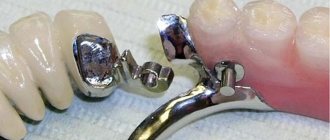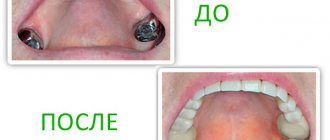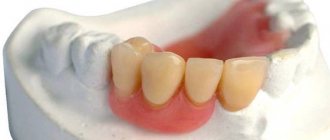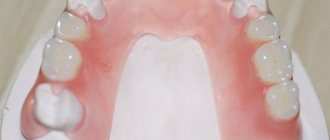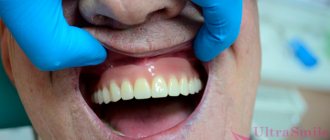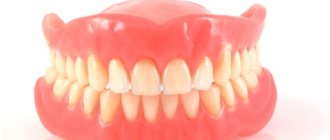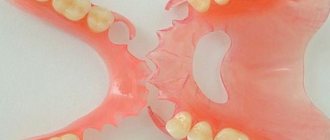675
Artificial dental prosthetics often becomes an inaccessible procedure for a number of patients.
The reason for this is a number of contraindications, the main of which are dental diagnoses and individual intolerance to the components of the prosthesis, which can provoke an acute allergic reaction.
The designs discussed in this article solve this problem by 95%.
Characteristics of prostheses
Polyurethane dentures are removable structures. This is an analogue of nylon prostheses. They are very popular today due to the presence of all the advantages of nylon prostheses in these designs. Their pleasant difference from this type is their affordable cost.
Manufactured from plastic, which has high flexibility and elasticity, which are even higher than those of nylon analogues.
Polyurethane dentures can withstand high loads and temperature changes, and they do not cause allergic reactions. Thanks to these indicators, their service life is quite long.
They can be used even for people with allergies to metal or acrylic, as well as for patients with weak gums.
Note: Polyurethane differs from other materials in that it does not absorb moisture, so bacteria do not develop on its surface, which can cause inflammation and bad breath.
There are practically no contraindications to the installation of such prostheses. But there is one main thing - polyurethane dentures are not installed if all or a large number of dental units are missing.
Patient reviews
I have been using polyurethane prostheses for more than 5 years. During this time I did not have any complaints. I really hope that the product will serve me for several more years.
Elizaveta Shishkina
I have been boxing professionally for many years. I think the main disadvantage of this sport is the need to regularly visit the dentist. My friend advised me to get a polyurethane denture, which will help avoid unpleasant visits to the dentist. I listened to his recommendations and have no regrets. The product turned out to be high quality and well fitted.
Roman Leonidov
All my life I suffered from dental problems and by the age of 70 I became practically toothless. I went to the nearest dental clinic and was advised to use a polyurethane prosthesis. After much thought, I decided to make it. The price wasn't as much as I thought.
The prosthesis was made quite quickly and it fit perfectly after the first fitting.
I have been using it for several months now and do not regret the money spent. For the first time in many years, I can chew food normally without experiencing discomfort or pain. Alexandra Miroshnichenko
pros
Let's look at the main advantages of polyurethane:
- It is biocompatible, environmentally friendly, and not noticeable in the mouth due to its high lightness. Getting used to the prosthesis takes place in a short time.
- Does not cause allergic reactions.
- It has an affordable price for people of average income.
- The prosthesis lasts three to five years. Then it can be easily replaced with an identical one.
- Easy to maintain without significant financial and time costs.
- It has strength, reliability and wear resistance.
- When chewing, it promotes uniform distribution of load, involving all dental organs, resisting atrophy of bone and soft tissue.
- Outwardly, it is as attractive as possible and looks good in the oral cavity. A structure that is absolutely identical to the shade, shape and texture of living teeth is created from polyurethane.
- Due to its high flexibility and softness, it takes on the anatomical shape of the jaw bone and fits tightly to adjacent teeth, mucous membranes and palate.
- It is stronger than dentures made from other materials, despite its high elasticity.
- The prosthesis is secured with elements that are also made of polyurethane of the desired color and easily hide the system in the oral cavity. Whereas in many other dentures, the fastening elements are made of metal, which is noticeable on the teeth, can cause allergies and injures both soft and hard tissues.
- Does not absorb moisture, dyes and pigments. Therefore, the color of the denture does not change throughout the entire duration of use, and bacteria, plaque and tartar do not accumulate on the material, allowing many adverse consequences to be avoided.
- The material copes well with temperature changes and high chewing loads, which makes it possible to wear it for a longer period of use.
- High manufacturing precision eliminates numerous adjustments.
- Can be used for pediatric patients, as well as for athletes or workers in hazardous professions.
- The denture does not require constant removal from the mouth at night and soaking. It can be worn constantly.
The essence of polyurethane models
Many patients, studying current information on the Internet, are interested in choosing nylon or polyurethane prostheses (reviews of which are very positive).
The thing is that polyurethane is a domestic analogue of European nylon, which has gained popularity throughout the world.
This material is nothing more than a flexible plastic, possessing its lightness, softness and ability to quickly adapt to the anatomical shape of the jaw.
That is, in all respects the models are not inferior to nylon ones: ease of use and wearing, quick adaptation, easy care and durability.
Polyurethane dentures
But compared to nylon, polyurethane costs clients several times cheaper, which makes prosthetics affordable even for pensioners and low-income groups of the population. In addition, this composite is more flexible and soft than nylon, which makes wearing as comfortable as possible and does not cause allergies.
Due to the composition of the product, many people confuse polyurethane with acrylic, but these are completely different materials. The first one absorbed all the requirements of modern man, preserved and increased the positive properties of various materials, while there were significantly fewer disadvantages.
The design of models made from this composite is always removable or partially removable.
Indications and contraindications
The use of polyurethane dentures is recommended in the following cases:
- One or more missing dental organs.
- When the outer supporting teeth are missing.
- High sensitivity of the tooth surface, as well as mucous and soft tissues.
- Having an allergic reaction to metal or acrylic.
- Weak gums or bone tissue.
Such designs are absolutely contraindicated if the patient has individual negative reactions, allergies or complete atrophy of bone tissue.
Care of prosthetic structures made of polyurethane
Polyurethane dentures require regular maintenance. Measures aimed at maintaining the prosthetic structure in good condition include:
- removing and rinsing the polyurethane denture in running water after each meal, before daily brushing of teeth;
- refusal to use toothbrushes and toothpastes (especially abrasive ones) to clean the denture;
- regular treatment of the device with a cleaning solution, transfer of the prosthetic structure to a special department of the dental clinic for professional cleaning.
Proper care can extend the service life of a polyurethane prosthetic structure to 5-6 years.
Manufacturing and installation
Let's consider the stages of manufacturing a polyurethane structure:
- Initially, you need to rid the patient of existing dental diseases. The doctor treats tooth decay, removes bacterial plaque and cures gum disease. If there are individual problems, such as bite defects, they are also eliminated.
- When all problems that could interfere with prosthetics have been eliminated, the specialist selects the tone of the material that best matches the color of the teeth and gums.
- Impressions of the jaws are made. If necessary, they are x-rayed.
- The resulting material is sent to the laboratory for direct production of the prosthesis. If the laboratory is located in the clinic itself, the prosthesis will be made faster and will cost less.
- The finished structure is tried on and fixed in the oral cavity. If necessary, the prosthesis is adjusted.
Main stages of implementation of polyurethane prostheses
The process of manufacturing and installing a polyurethane prosthesis takes a certain time and consists of several main stages.
First of all, it is necessary to carry out sanitation of the oral cavity, a thorough examination and, if necessary, determined by the doctor, elimination of current problems: treatment of caries areas, removal of inflammation, removal of plaques caused by bacteria.
Then the tooth color is selected that will look most natural in the patient’s mouth.
Taking impressions of both upper and lower jaws, making the prosthesis itself in a specially equipped laboratory, as well as fitting and, if necessary, correction - those are the stages that precede the final one - fixing the prosthesis in the patient’s oral cavity.
Fixation methods
A polyurethane prosthesis can be fixed in the oral cavity in three ways:
- By means of clasps (hooks). These fasteners do not harm the dental organs because they are made of the same polyurethane and not metal.
- Through attachments (locks). With their help, the prosthesis is attached to the supporting teeth.
- Telescopic crowns. One part of the product is attached to the prosthesis, and the second to the dental organ.
The doctor determines which fixation method to choose based on the number of missing teeth and the individual characteristics of the patient.
Operational period
According to experts, the average service life during which a material is able to fully withstand the load placed on it without compromising its direct functionality is three years.
However, according to the majority of users of this type of prosthesis, this period can be longer with proper care and respect for the product.
Such a relatively short period of time is caused by the inevitable processes of internal resorption of hard bone tissue, which begin to form immediately after the amputation of the tooth, and do not stop under the prosthetic crown.
Rules of care
Polyurethane structures are easy to maintain, but they need to be looked after carefully. In addition to oral hygiene, cleaning the denture itself should not be neglected.
Both the denture and teeth should be cleaned twice a day using a soft brush with cross-bristles.
You can use a special paste that is gentle on the material, but it should remove plaque well.
The use of abrasive and bleaching agents, as well as powder, is prohibited. If for some reason there is no paste, the product can be washed with warm water with added soap or a special rinse aid.
After each meal, the mouth should be rinsed thoroughly. It is also recommended to use a irrigator with a disinfectant solution several times a week. The space between the teeth should be cleaned with floss (dental floss).
The polyurethane denture should be immersed several times a week in a cleansing agent recommended by the doctor.
Regular visits to your doctor twice a year to have your dentures fitted and cleaned are also important.
If you follow all of the above rules, the service life of the structure will be more than five years.
FAQ
Question
— What is polyurethane for dental prosthetics?
Answer
“It is a material with unique properties from which both the base of the prosthesis and the fastening elements are made.
Question
— What are the advantages of polyurethane products?
Answer
— Lightness, convenience, strength, harmlessness. They can be perfectly fixed in the oral cavity, so the patient feels comfortable when wearing them. Microbes do not grow on these products.
Question
— How long can the use of such prostheses last?
Answer
— With high-quality care of the oral cavity and structure, as well as with regular visits to the doctor, they last at least five years.
Question
— When is it recommended to install polyurethane products?
Answer
— They can be used in any clinical situation. They can restore both individual teeth and the entire dentition. These products are most recommended for patients who do not want to grind their living teeth.
Question
— What is the price of the structure?
Answer
— The price is approximately 21,500-37,000 rubles.
